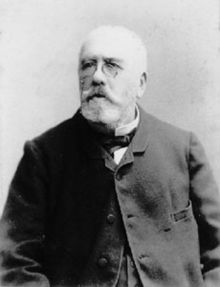Fortune du Boisgobey
Fortuné du Boisgobey , actually Fortuné Hippolyte Auguste Castille , (born September 11, 1821 in Granville , Département Manche , † February 26, 1891 in Paris ) was a French writer.
Life
Boisgobey came from an old wealthy family and attended the Lycée Saint-Louis . A partisan of King Louis-Philippe I through his family , he joined the army during the July monarchy . He acted u. a. as paymaster and fought between 1844 and 1848 under General Thomas Bugeaud in Algeria against Abd el-Kader .
In early 1848 Boisgobey returned to France and settled in Paris. He left the army and thanks to his family fortune was able to settle down as a freelance writer. Due to the politically troubled times ( February Revolution 1848 ) he was only able to achieve his artistic breakthrough in 1868 with his work "Les deux comédiens".
On the basis of this publication, the publisher Paul Dalloz from Le petit moniteur signed him for seven years. In this way Boisgobey became an editor and soon one of the most famous columnists of his time. With the publication of his novels “Une affaire mystérieuse” and “Le Foçat colonel” in 1869 at the latest, he was the bestselling author of his time. In 1877 the daily newspaper Le Figaro commissioned him with a series of stories and this alone enabled the circulation to be increased significantly.
Boisgobey had been a member of the Société des gens de lettres for a long time and in 1885 it was elected president; At the end of 1886 he resigned from this office. At the age of 69, Boisgobey died after a long illness on February 26, 1891 in Paris, where he found his final resting place.
reception
Fortuné du Boisgobey is considered one of the most famous successors of Émile Gaboriau . Four years after his death, Boisgobey published his cycle “La vieillesse de M. Lecoq” and thus took over Gaboriau's protagonist Monsieur Lecoq . Boisgobey's private investigator Piedouche from Paris , who also acted in several novels, is considered a kind of further development of Lecoq . Fortuné du Boisgobey's novels are a successful mixture of crime fiction or detective novel , historical and social novels ; One focus is very often the capital Paris and the society that lives there.
Works (selection)
- La bande rouge . Dentu, Paris 1886 (2 vols.).
- Le billet rouge . Boulanger, Paris 1884.
- Le chevalier Casse-Cou . Dentu 1873.
- Le camelirouge .
- La chasse aux ancêtres .
- La crime de l'opéra . Nourrit, Paris 1889.
- La pelisse du pendu .
- La loge sanglante .
- Le demi-monde sous la terreur . Dentu, Paris 1876.
- L'équipage du diable . Dentu, Paris 1881.
- Les Gredins . Dentu, Paris 1872/73 (2 vol.).
- La main coupée . Plon, Paris 1880.
- Le mari de la diva . Dentu, Paris 1884.
- La tresse blonde . Dentu, Paris 1875.
- La vieillesse de M. Lecoq . Dentu, Paris 1878.
literature
- Armin Arnold: Reclam's detective novelist . Reclam, Stuttgart 1978, ISBN 3-15-010278-2 , p. 146.
- George W. Moon: Fortuné du Boisgobey . In: Ders .: Men and women of the time. A dictionary of contemporaries . Routledge, London 1891, p. 278.
| personal data | |
|---|---|
| SURNAME | You Boisgobey, Fortune |
| ALTERNATIVE NAMES | Castille, Fortuné Hippolyte Auguste (real name) |
| BRIEF DESCRIPTION | French author |
| DATE OF BIRTH | September 11, 1821 |
| PLACE OF BIRTH | Granville |
| DATE OF DEATH | February 26, 1891 |
| Place of death | Paris |
